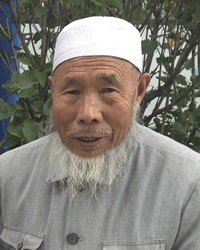Hui in Myanmar (Burma)

Photo Source:
Leslie D. Montano
|
Send Joshua Project a map of this people group.
|
| People Name: | Hui |
| Country: | Myanmar (Burma) |
| 10/40 Window: | Yes |
| Population: | 9,000 |
| World Population: | 13,901,000 |
| Primary Language: | Chinese, Mandarin |
| Primary Religion: | Islam |
| Christian Adherents: | 0.00 % |
| Evangelicals: | 0.00 % |
| Scripture: | Complete Bible |
| Ministry Resources: | Yes |
| Jesus Film: | Yes |
| Audio Recordings: | Yes |
| People Cluster: | Chinese Muslim |
| Affinity Bloc: | East Asian Peoples |
| Progress Level: |
|
Identity
Although the Hui are ethnic Han Chinese people who follow Islam, they have long been considered distinct from the Han diaspora because of their faith and distinct culture. The name Panthay is a Burmese label used by other ethnicities to describe the Hui, but the name is not used or known in China.
Location: Approximately 9,000 Hui people, or Chinese Muslims, live in Myanmar today. They are predominantly found throughout northern parts of the country, including several districts of Shan State and the Mandalay Region. Hui communities are also located in Myanmar's largest city, Yangon. More than 14 million Hui people inhabit at least 15 countries around the world. Apart from 13.7 million in China, significant populations of Hui are found in Thailand (91,000), Kyrgyzstan (76,000), Kazakhstan (71,000), Taiwan (57,000), and Saudi Arabia (37,000). In Central Asia the Hui are often known as the Dungan, while in Myanmar they are commonly called Panthay.
Language: The Hui speak standard Mandarin; although, in some locations, Persian and Arabic loanwords have been added to their vocabulary. Although Islamic law dictates that the Qur'an must only be printed in Arabic, few Hui men know more than a few key religious expressions in that language. Many Hui in Myanmar are now able to speak the languages of neighboring groups, including the Burmese, Shan, and Wa.
History
By the mid-seventh century, Arab and Persian merchants had traveled to China in search of riches. Some settled down and gradually formed into the Hui people. Later in the 13th century, the Mongols turned people into mobile armies during their Central Asian conquests and sent them to China. These civilians were expected to settle down at various locations to farm while maintaining combat readiness. As artisans, scholars, officials, and religious leaders, the forefathers of the Hui spread throughout China. One of the worst cases of genocide in history took place against the Hui in Yunnan from 1855 to 1873. At least one million people were massacred, which led to many Hui crossing the border to seek new lives in Myanmar and other parts of Southeast Asia.
Customs
The Hui are forbidden to eat pork, but that prohibition is often overlooked by calling the meat “mutton.” A Chinese joke is that “One Muslim traveling will grow fat; two on a journey will grow thin.” The Hui are renowned as sharp businessmen, as reflected in a 19th century Chinese proverb: “A Chinese awake is not the equal of a Hui sleeping.” After settling in Myanmar, the Hui continued to trade many of the same products they had in China, including silk, tea, felt, clothing, opium, walnuts, preserved fruit, and dried meat. As their network of contacts increased, the Hui also expanded into trading jade, rubies, and other precious stones.
Religion
To be a Hui person means to be a Sunni Muslim. They worship in their own mosques in Myanmar, funded by members of their community. Islam first came to China via Abu Waggas, one of Mohammed's contemporaries, who preached in south China in AD 627. Despite speaking the same language as the Han, the religion of the Hui has separated them from Chinese communities in all the countries they reside in.
Christianity
Mission work among the Hui in north China commenced in 1885, but few converts were won to Christ before the advent of Communism in 1949. In those rare instances where Hui have become Christians, they tend to then be viewed as Han Chinese and are often cast out of the Hui community. There are no known Hui Christians in Myanmar today, and few have ever heard the truths of the Gospel in more than fleeting terms. Although the Hui speak Mandarin and read Chinese, Christian organizations have wisely started to produce evangelistic resources, including the Jesus film, in formats specifically designed to reach Hui people by appealing to their cultural and religious worldview.